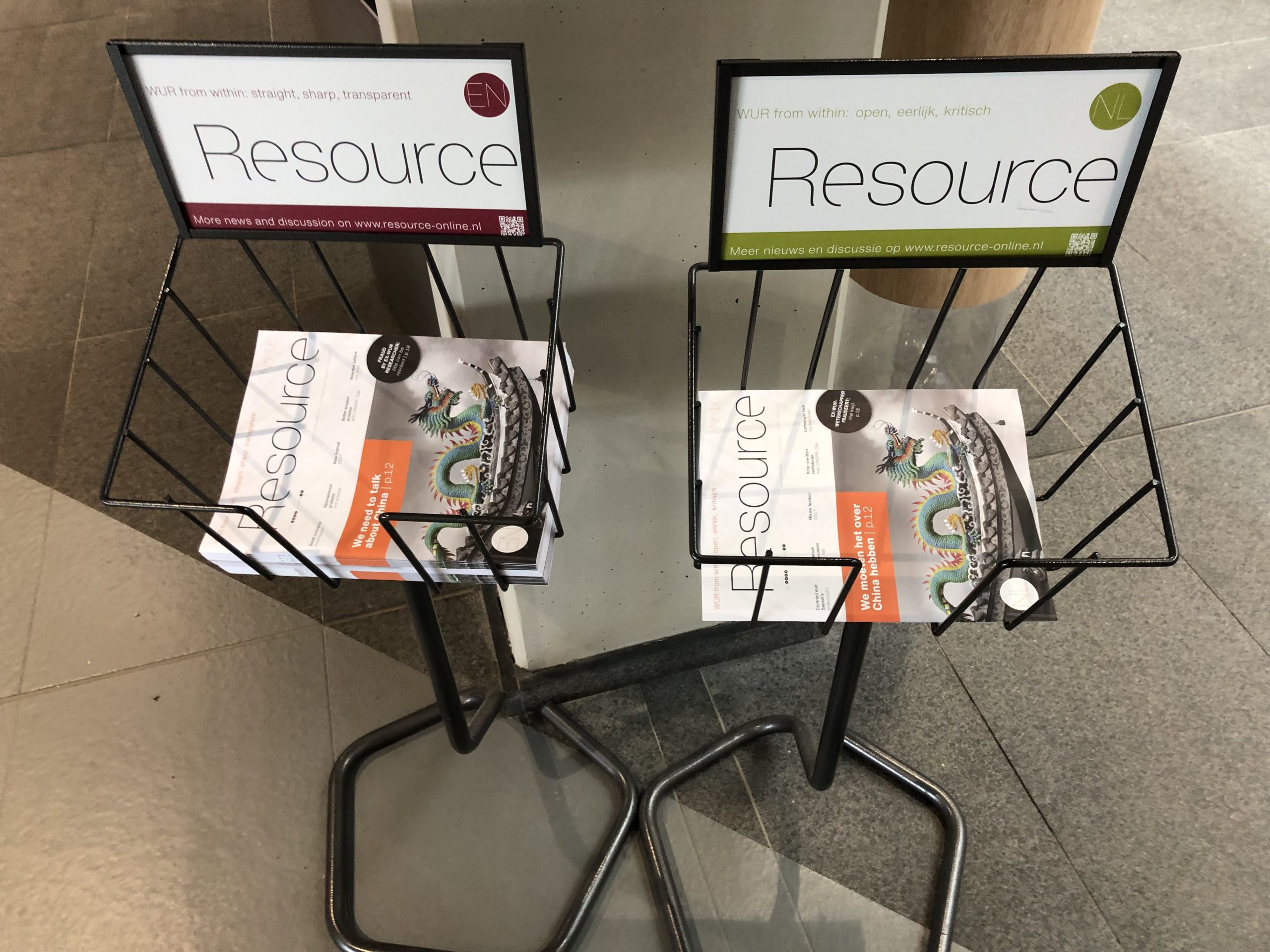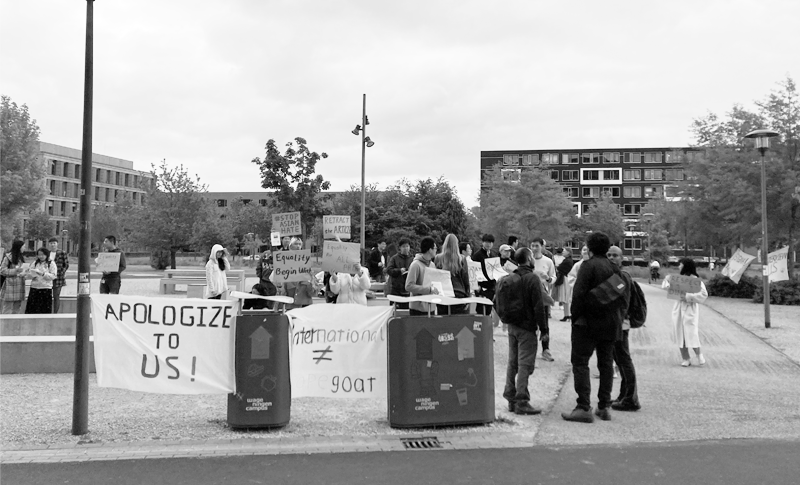The Resource Editorial Board has received two complaints following the ‘We need to talk
about China’ article, which appeared in Issue 16 of May 2023. Both complainants indicated
that the Chief Editor did not take their complaint sufficiently seriously.
According to Article 6.1 of the Editorial Statute, the Editorial Board is responsible for
assessing whether the article violates the journal’s basic principles as formulated in Article 1
of the Editorial Statute. This refers in particular to Articles 1.3 and 1.5.
Both complaints were reviewed by the Editorial Board in a meeting on 29 June 2023. Prior to
this meeting, members also took cognisance of the responses to the relevant article on
Intranet, as well as the statements made by the Chief Editor, both in the magazine and orally
during the meeting. The latter is required by virtue of Article 6.1. After offering his
explanation, the Chief Editor left the meeting, and the Editorial Board went on to reach five
conclusions.
These conclusions are as follows:
1) As far as we can assess, there has been no de jure racism or discrimination. We
therefore see no reason at present for apologies or to withdraw the article. Having
said that, the tone of voice of some of the phrases in the article may be perceived as
condescending. This was also acknowledged by the Chief Editor in his foreword in
Issue 18 (June 2023), in which he indicated his willingness to adjust some of the
wording. We advise the editors in future to be more mindful of the international
nature of the WUR community, and to choose their words more carefully.
2) The background of the article was a report by the Wageningen Graduate Schools
(WGS), which is not publicly available. While the content of the report is unknown to
us, we see no reason to assume that it was misrepresented. However, we do have
the impression that the author identified a little too much with the conclusions of the
report and, as a result, did not take enough critical distance.
3) The article discusses both the situation of PhD students from China, and China’s
geopolitical role and how the Netherlands should relate to it. In retrospect, it would
have been better to not cover these topics in one article, but to split them into two
separate articles, or place them in separate text boxes. This would have helped
prevent individual PhD students from being associated with China’s role on the world
stage. This has in the meantime also been acknowledged by the Chief Editor in his
foreword in Issue 17 (June 2023).
4) Concerning the requirement for a rebuttal, we note that while it is common practice
to include it in or alongside the relevant article, this is not a journalistic requirement.
Rebuttal can also take the form of a follow-up article, or making room for submitted
responses. In this case, these options are obviously very suitable, as the headline of
the article ’We need to talk about China’ naturally invites discussion on the subject
in Resource.
5) According to Article 1.3 of the Editorial Statute, Resource has two main objectives: 1)
to contribute to the organisation’s mission and policy, and 2) to meet the information
needs and interests of its readers. In this case, we agree with the Editors’
consideration that the importance of informing the WUR community about the WGS
report outweighed any impact on the organisation. All the more so since the article
was submitted to the Rector Magnificus and the Corporate Communications press
officer prior to publication, neither of whom objected to the publication.
We have since informed the complainants of the above conclusions and recommendations.
Given the ensuing discussion, we think it is appropriate to share this information publicly by
publishing this announcement in Resource.
On behalf of the Editorial Board,
Joost van Kasteren (Chair)
Response Editorial Board to complaints about China article
The Board presents its conclusions.

Leave a Reply
You must be logged in to write a comment.



It is clear that we differ in opinion on the extent to which the article ‘We need to talk about China’ reports ‘happenings and developments in and around Wageningen UR in an impartial and objective, or intersubjective, manner’ – as required according to the Basic Principle 1.5 in the Editorial Statutes of Resource. One issue on which we cannot disagree, I assume, is the fact that the statement that ‘An estimated 80 per cent of Chinese PhDs do not pay a bench fee’ is of fundamental importance for the article. It was on the basis of the implication ‘that WUR misses out on hundreds of thousands in revenue every month‘, and statements like ‘China is notoriously difficult to get to pay up’, or ‘ Cheap scholarship PhDs are a business model […] Dutch taxpayers are helping to fund the education of Chinese people’, and it sets the tone of the whole article. According to Basic Principle 1.5 in the Editorial Statutes, the Resource team should be ‘verifying the sources and facts of both sides of a situation’. It remains unclear to me (1) what is the source of the 80% estimate, and (2) how the estimate was checked. Did the Resource team ask WGS to make an inventory among the five Graduate Schools and/or various chair groups of Chinese PhDs paying bench fees? Did the Resource team ask the Chinese PhD students to organise an anonymous survey on this issue through the WeChat group of Chinese PhDs in Wageningen? Such a crucial estimate – presented as fact – should definitely be checked before publishing.
Looking forward to your answer on this crucial matter that, to my surprise, was not addressed in your official response to the complaints.
Just wanted to let readers know that the voices of Chinese PhDs who initiated the petition letter and organized the demonstrations are not represented in any piece of Resource’s publication so far, nor were they included in the interviews of Resource’s latest release “It feels like there is an institutional bias against us” on June 29, 2023.
Why were they excluded? The Editor-in-Chief declined to meet with them to listen to their concerns and reasons when they expressed their hesitation to rush into accepting Resource’s interview within a three-day deadline for the edition’s production. Instead, he insisted that his team would “try to find a way to do a follow-up story in another way.” The piece published on June 29, 2023 seems to serve as that “another way” to defend the editorial team and repair Resource’s reputation. It is misleading by, e.g., using the subheading “Chinese PhD candidates have their say in response to an article previously published in Resource,” creating the untrue impression that Chinese PhDs’ views and opinions are well represented in this piece and they are happy with this solution provided by Resource.
Has the editorial team thoroughly read and considered the petition letter (https://forms.gle/PbKSiorVbtKBvUju7), which was signed by 773 individuals, the documented responses from some Chinese PhD students (https://forms.gle/CpVvNZhrHQnfjWhh9), and the critiques from organizations such as the Anti-Racism Association (ARA) Wageningen, the Dutch Anti-Asian-Racism NGO, Asian Raisins, another WUR journalism outlet, The Jester (article “We need to talk about Resource” in Edition 14), as well as the perspectives shared by numerous members of the WUR community?
“The opposite of love is not hate, but indifference.” That indifference is often rooted in prejudice and arrogance, in the belief that some people, such as Chinese, are inferior, and in an authoritarian approach that rarely listens to others.
It took a day for Resource to review and approve my comments above before they were shown here. If I had not reached out by email to inquire about the restriction on my commenting rights, I am uncertain how long it would have taken for my comments to be publicly visible.
I have never engaged in any disrespectful comments before. I would appreciate an explanation of which rule my comments above violated in terms of “freedom of speech” that the editorial team has been proud of.
Resource, as a self-proclaimed “critical” journalism outlet, it is important for you to be able to accept and consume critical comments, even if they are not to your liking. I believe you are also aware that restricting people’s rights or freedom to comment, through whatever mechanism, is not the appropriate way to address problems. I hope we are listening to each other.
P.S. Access to the article “We need to talk about Resource” published by The Jester:
https://forms.gle/MUpJnuDQrjaZPpgA8
Who cares about ‘de jure’ discrimination?
In our published and widely cited research on land tenure security in China*, we make a distinction between de jure, de facto and perceived tenure security. We explain that the way in which legal provisions are implemented (= de facto tenure security) is more relevant for stakeholders than the legal provisions (= de jure tenure security) themselves, but what matters most is the stakeholders’ own assessments of their tenure situation (= perceived tenure security).
In the case of discrimination, is de facto discrimination and perceived discrimination not what we should care about at WUR? Even if there happens to be no de jure discrimination in the ‘We need to talk about China’ article, de facto discrimination in the article is evident: A false claim about lack of bench fee payments and an unfounded claim that all Chinese PhDs are obliged to report on each other and those they interact with, are used by the journalist to make many stigmatising remarks about the Chinese community at WUR. And most of all, the article significantly contributes to perceived discrimination as is evident from the outcry that the article gave rise to and from the large number of persons who signed the petition. This is what we should worry about at WUR, not whether there was ‘de jure’ discrimination or not.
*: Ma, X., N. Heerink, S. Feng and X. Shi (2015) ‘Farmland tenure in China: Comparing legal, actual and perceived security.’ Land Use Policy 42: 293-306.